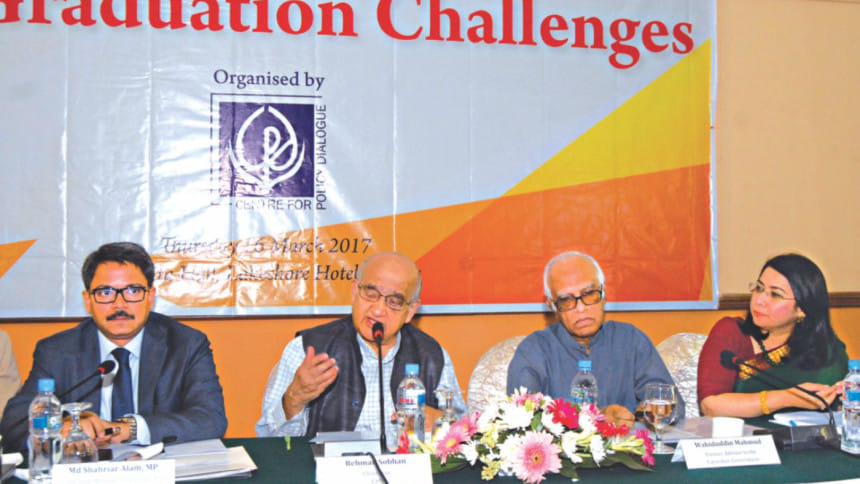Prepare for challenges in post-LDC era: analysts

Bangladesh must take adequate preparation and come up with a well-thought-out strategy for its life as a developing country from 2024 onwards, experts said.
The country is on course to joining the group of developing countries in 2024, after being an LDC since 1975.
After the graduation, the country will get three years to adjust to the modalities of being a developing country, after which its quota-free and duty-free access to developed economies, eligibility to low-cost financing along with other benefits will come to an end.
“We actually have before us a ten-year gap,” said Rehman Sobhan, chairman of the Centre for Policy Dialogue, at a discussion styled 'Bangladesh and the LDC Graduation Challenges', organised by the think-tank at the capital's Lakeshore Hotel yesterday.
“And in this 10 years, if we do not shape us then we should be facing not just a variety of economic problems but a variety of social and political problems as well, which may become even more unmanageable.”
For instance, Bangladesh now gets 15 percent tariff benefit over developing countries in terms of market access to the developed countries; this benefit will be lost upon graduation.
So entrepreneurs should use the time to enhance their export competitiveness such that they can compete even after the end of the tariff benefits, he said.
As Bangladesh does not have enough natural resources, it can learn from Japan, South Korea and other countries and turn its huge population into a resource.
“Invest in quality education. We should see our people as resource and invest in them,” he added.
In a paper presented at the event, CPD Distinguished Fellow Mustafizur Rahman said Bangladesh might be included in the graduation list in next year's review by the United Nations.
The Committee for Development Policy (CDP), a body of the UN Economic and Social Council, is responsible for reviewing the status of LDCs and monitoring their progress following graduation from the category.
The CDP reviews a country's position based on three criteria: gross national income per capita calculated based on three-year average, human asset index (HAI) and economic vulnerability index (EVI).
A country has to pass the threshold in two of the three criteria.
Bangladesh will be considered for graduation because of passing the threshold in HAI and EVI, Rahman said, adding that the third threshold is expected to be conquered by the time of 2021 review.
“As a whole, our analysis shows that Bangladesh will be able to strongly come out of the LDC category by 2024 -- it is a matter of pride.”
But, there are challenges, he said, citing the end of preferential market access for Bangladesh's products and increased cost of foreign loans as examples.
At present, Bangladesh enjoys preferential access of varying degrees to markets of more than 40 countries.
The country's exports will face an additional 6.7 percent tariff once it graduates from the LDC status. Export may fall by 5.5 to 7.5 percent as a result of withdrawal of preferential access, he said.
“So, we have to adopt a strategy for smooth graduation during this period. And all, including government, private sector and civil society, have important roles in this respect.”
Rahman suggested product and market diversification, and increasing regional cooperation for market access, particularly to India and China.
“Time has come for Bangladesh to selectively venture into bilateral and regional trade and investment agreements keeping the development of supply and value chains in the purview.”
Rahman stressed the need for adequate preparation before final graduation.
“Because, once Bangladesh has graduated there is no going back,” he added.
Bangladesh should take preparation so that it can negotiate to be part of various bilateral and regional agreements and reap benefits from that, said Wahiduddin Mahmud, a former adviser to the caretaker government.
Heavy dependence on apparel makes Bangladesh's export prospect vulnerable.
“It is very narrow. The industrial base dependent on garments is also narrow,” he said, while calling for strengthening production base and improving efficiency.
A comprehensive transition strategy should be taken, said Md Shahriar Alam, state minister for foreign affairs, adding that a countrywide assessment of the implications on the various sectors of the economy upon graduation and erosion of market access will be helpful.
However, the government will try to retain preferential market access beyond graduation and the foreign affairs ministry has already started working on it, he said.
The cost of doing business should be cut to encourage investment and business activities, said Kazi Anis Ahmed, director of Gemcon Group.
Excessive rent-seeking and bureaucratic obstructionism discourage investment and private sector growth.
“This has to be addressed,” Ahmed said, adding that the cost of capital should be low and power and gas should be available.
The government is working on easing the bureaucratic red tapes, said Abul Kalam Azad, chief coordinator of Sustainable Development Goals Affairs.
“We have changed the red tape to white tape,” he added.
The cost of land is a big concern for investors, said Shafiul Islam Mohiuddin, vice-president of the Federation of Bangladesh Chambers of Commerce and Industry.

 For all latest news, follow The Daily Star's Google News channel.
For all latest news, follow The Daily Star's Google News channel. 



Comments